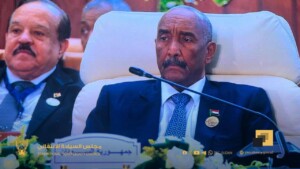Eastern Sudan conference demands right to self-determination
The ‘Peace, Development and Justice Conference’ in Sinkat in Red Sea state demanded the right to self-determination for the region yesterday. Lt Gen Mohamed Hamdan ‘Hemeti’, Vice President of the Sovereign Council, was present at the final day of the conference.
 Hadendawa leader Sayed Tirik at the final day of the Eastern Sudanese conference (Social media)
Hadendawa leader Sayed Tirik at the final day of the Eastern Sudanese conference (Social media)
The participants of the Peace, Development and Justice Conference, organised by the High Council of Beja Nazirs* and Independent Chieftains in Sinkat in Red Sea state, demand the right to self-determination for the region. Lt Gen Mohamed Hamdan ‘Hemeti’, vice president of the Sovereign Council, attended the final day of the conference yesterday.
The recommendations of the conference, that started on Sunday, were presented to Hemeti. They include a unification of the three eastern Sudan states (Red Sea state, Kassala, and El Gedaref) into one region, “according to historical geographical boundaries”.
The region has the “fundamental human right to self-determination”, the memorandum states. Any interference from “outside” is rejected. Eastern Sudan should be ruled by its own people, and power must be shared at all levels. A joint high coordination body with representatives from all eastern Sudanese communities should be formed to prepare all this.
The eastern Sudanese leaders further demand the immediate cessation of all residential and agricultural schemes and land approvals, as well as a stop to all mining operations “until the foundations are laid that serve the interests of the people in the region”.

upon arrival in Sinkat yesterday (Social media)
Head of the Hadendowa clan and Chairman of the Beja Council Sayed Tirik said during his closing speech that eastern Sudan has been marginalised and has been suffering from injustices since Sudan became independent in 1956.
He denied the existence of tribal problems in eastern Sudan. “We do not fight other tribes. We will not bother the authorities with such problems.” He warned against “new parties who want to steal the revolution”.
Lt Gen Hemeti, who is not only Vice President of Sudan’s Sovereign Council but also Commander in Chief of the paramilitary Rapid Support Forces (RSF), acknowledged “the dire humanitarian situation in eastern Sudan”, and promised “to solve the problem of the three eastern states in the coming days”.
He lauded “the eastern Sudanese model of peaceful coexistence, suitable for teaching in universities”, and said that the recent clashes between ethnic communities are “strange” to him.
A number of Sudanese community leaders do not agree with the outcomes of the conference. They support the contents of the eastern Sudan track peace accord agreed upon in Juba. They adhere to the principle: “A tribe is for all, a political party is personal”.
For this reason, a group of 22 tribal chiefs separately handed Hemeti a memorandum in which they reject “any direct involvement of the Native Administration in politics, which would be political action under a tribal cover and which would create discord and confusion in the eastern Sudanese society”.
The conference held in Sinkat last week is not the first attempt to challenge the eastern Sudan track accord, that was signed in Juba in February this year by the Sudanese government and the Sudan Revolutionary Front (SRF) rebel alliance as part of the comprehensive peace agreement for Sudan.
Eastern Sudanese leaders already denounced that track accord on eastern Sudan before it was signed in February. Abdallah Mousa, chairmperson of the Beja Congress-Freedom and Change faction, categorically rejected the deal, calling it “worthless”. The community leaders called for a separate conference instead, to deal with the specific issues of the east.
* A nazir is a state-appointed administrative chief of a tribe, according to the Native Administration system in Sudan.
Radio Dabanga’s editorial independence means that we can continue to provide factual updates about political developments to Sudanese and international actors, educate people about how to avoid outbreaks of infectious diseases, and provide a window to the world for those in all corners of Sudan. Support Radio Dabanga for as little as €2.50, the equivalent of a cup of coffee.












 and then
and then